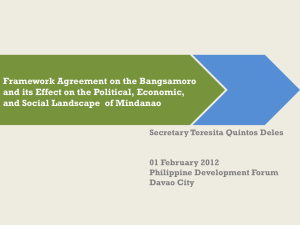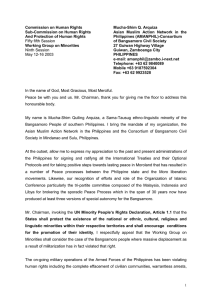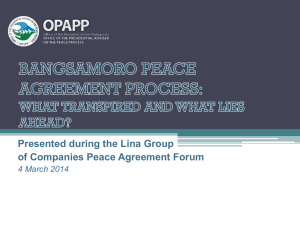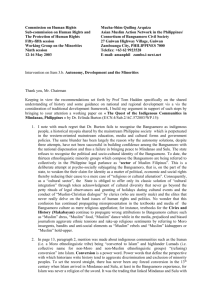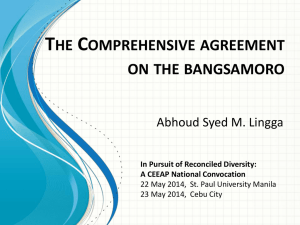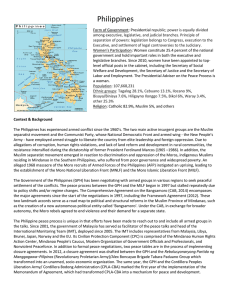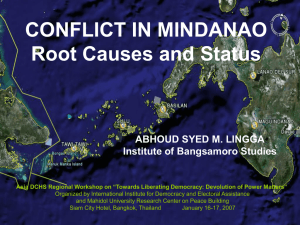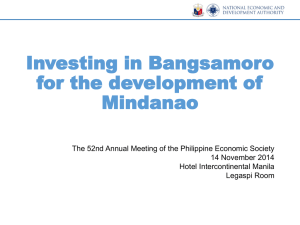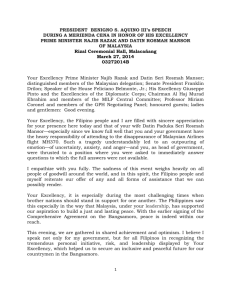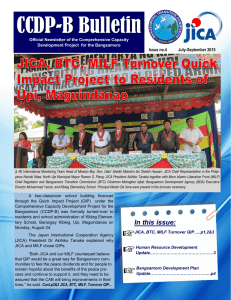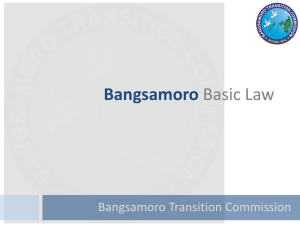SPEECH During the International Conference of Cotabato in Notre
advertisement
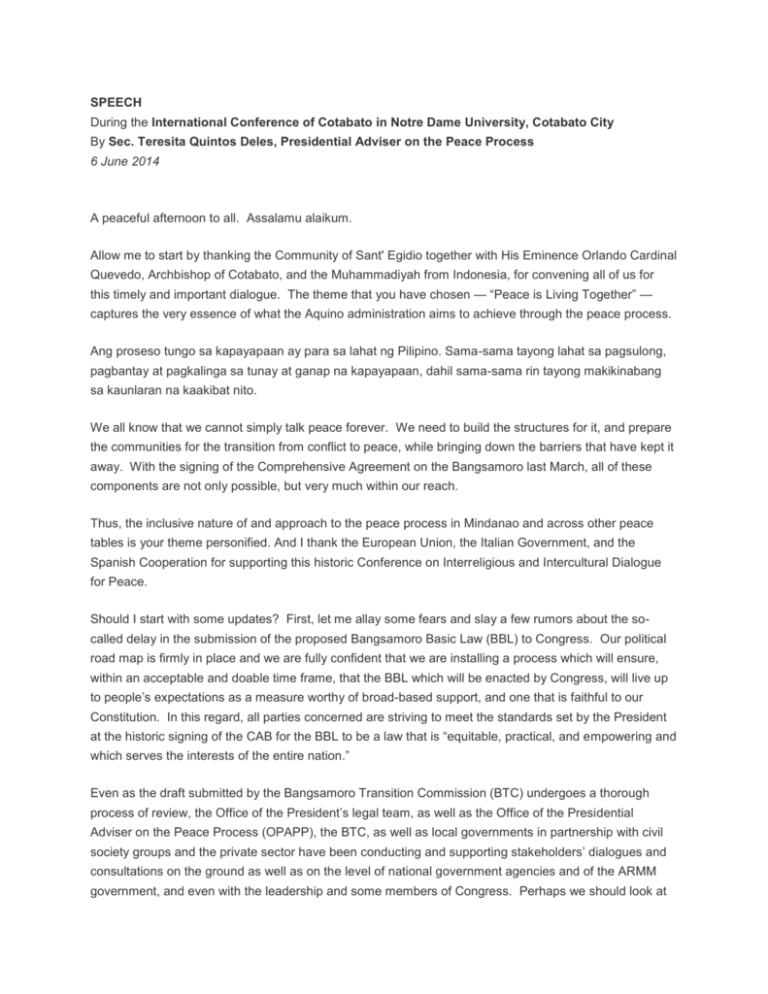
SPEECH During the International Conference of Cotabato in Notre Dame University, Cotabato City By Sec. Teresita Quintos Deles, Presidential Adviser on the Peace Process 6 June 2014 A peaceful afternoon to all. Assalamu alaikum. Allow me to start by thanking the Community of Sant' Egidio together with His Eminence Orlando Cardinal Quevedo, Archbishop of Cotabato, and the Muhammadiyah from Indonesia, for convening all of us for this timely and important dialogue. The theme that you have chosen — ―Peace is Living Together‖ — captures the very essence of what the Aquino administration aims to achieve through the peace process. Ang proseso tungo sa kapayapaan ay para sa lahat ng Pilipino. Sama-sama tayong lahat sa pagsulong, pagbantay at pagkalinga sa tunay at ganap na kapayapaan, dahil sama-sama rin tayong makikinabang sa kaunlaran na kaakibat nito. We all know that we cannot simply talk peace forever. We need to build the structures for it, and prepare the communities for the transition from conflict to peace, while bringing down the barriers that have kept it away. With the signing of the Comprehensive Agreement on the Bangsamoro last March, all of these components are not only possible, but very much within our reach. Thus, the inclusive nature of and approach to the peace process in Mindanao and across other peace tables is your theme personified. And I thank the European Union, the Italian Government, and the Spanish Cooperation for supporting this historic Conference on Interreligious and Intercultural Dialogue for Peace. Should I start with some updates? First, let me allay some fears and slay a few rumors about the socalled delay in the submission of the proposed Bangsamoro Basic Law (BBL) to Congress. Our political road map is firmly in place and we are fully confident that we are installing a process which will ensure, within an acceptable and doable time frame, that the BBL which will be enacted by Congress, will live up to people’s expectations as a measure worthy of broad-based support, and one that is faithful to our Constitution. In this regard, all parties concerned are striving to meet the standards set by the President at the historic signing of the CAB for the BBL to be a law that is ―equitable, practical, and empowering and which serves the interests of the entire nation.‖ Even as the draft submitted by the Bangsamoro Transition Commission (BTC) undergoes a thorough process of review, the Office of the President’s legal team, as well as the Office of the Presidential Adviser on the Peace Process (OPAPP), the BTC, as well as local governments in partnership with civil society groups and the private sector have been conducting and supporting stakeholders’ dialogues and consultations on the ground as well as on the level of national government agencies and of the ARMM government, and even with the leadership and some members of Congress. Perhaps we should look at what’s going on from a glass-half-full perspective: We have waited 17 long years for a mutually binding and acceptable peace process with the MILF; and yet that has been achieved within three years of this administration. We can be bold in taking a few more days, if not weeks, to ensure a more refined and strengthened draft BBL to be stewarded by the leadership of both Houses of Congress through the legislative process and thereafter for ratification through plebiscite. President Aquino is determined to wield the democratic process to install the Bangsamoro as a partner in ensuring common prosperity, collective security, and good governance in the four corners of our archipelago. We in government, take our shared journey to peace through the Bangsamoro very seriously. It is just as personal to us, as it is to all of you in this room. And the President has repeatedly committed to wield his leadership and muster the necessary political capital to ensure the law will be passed and that the law that will be passed will serve the welfare and interest of the Bangsamoro surely but also of other areas in Mindanao, and of the entire Philippines. Perhaps we should also be reminded that the political process is a major stepping-stone to the attainment of something that is bigger than that process itself: a national vision and people’s aspiration for genuine peace. Let me articulate that vision for you. Through the Bangsamoro, we shall strengthen the politics of reconciliation and build an economy of equal opportunity. No one – Muslim, Christian, Lumad or of any other faith – will be left behind. Each will enjoy the benefits of good governance, social equity, and most of all, the rule of law, in a society of cultural and religious diversity. This inclusivity is mirrored by how the BTC was formed, with representatives of Muslim, Christian, and indigenous people appointed as commissioners. The envisioned Bangsamoro ministerial government will also have allotted seats to ensure that diverse voices will be heard as part of policy-making and good governance. The central government will always uphold its role to ensure that unity in diversity flourishes, and that peaceful coexistence and shared prosperity shall be the norm in a Bangsamoro era. The good news is that even as we have yet to complete the political transition as defined in the Comprehensive Agreement on the Bangsamoro, the work of implementing the Normalization Annex has already begun and milestones along this comprehensive post-conflict track will also soon become apparent. The good news is that even as we have yet to complete the political transition as defined in the Comprehensive Agreement on the Bangsamoro, economic gains are clearly on the horizon, and even in the pipeline. Last Wednesday, a high-level business delegation accompanied by no less than US Commerce Secretary Penny Pritzker met with the President, and they expressed interest in putting up potential investments in infrastructure projects for Mindanao. On the same day, ambassadors from member countries of the Organization of Islamic Cooperation visited Bongao, Tawi-Tawi – specifically, a sample of MNLF Peace and Development Communities (PDCs). They lauded the government of the Philippines for its continued efforts to improve the lives of Muslims in Mindanao and likewise pledged to assist the development efforts in every way possible and open to them. Our neighbors in the ASEAN community are just as keen in bringing in technical assistance and financial resources as investments in your region, with our immediate peace partner, Malaysia, inquiring into how they can help promote the Philippines’ Halal Industry as well as Islamic banking. In our own backyard, we have our own innovative and dynamic private sector, looking at the rise of the Bangsamoro as the tide that will lift our economic conditions higher than ever before. Together with the World Bank, the Government and the MILF have agreed to organize a Development Forum on the Bangsamoro this coming September to be participated in by the international development community and the private sector to bring forward, discuss, and facilitate the delivery of concrete and immediate peace dividends for their investment and participation. To witness such an outpouring of support and optimism from individuals, organizations, sectors, and countries – all clearly invested in a shared interest to build a society founded on peace and unity – is both encouraging and overwhelming. Peace is ultimately about coexistence and inclusion. In no way is it a one-way street. Peace is for all of us and, thus, requires a shared commitment from all of us, as well. Today, this commitment is fully fleshed out in this diverse assembly. I see men and women of varying levels of experience and expertise, of divergent faiths and ethnicities coming together yet again to secure the peace that we all thought would elude this and future generations. And yet, here we are. No longer just talking about peace but living in it and for it – together. During this dialogue, let us open our minds and heart, and be generous in sharing what we consider our most important needs and heartfelt desires in the Bangsamoro society that we want to shape. Conflicting opinions and positions will arise, but that is what dialogue is all about. Amid such differences lie our determination to identify the issues we need to address and iron out as a reconciled, if not united, whole. Remember what Nelson Mandela once said? He had posted the challenge: ―Sometimes it falls upon a generation to be great. You can be that generation.‖ What our forebears dreamt about, we now have a duty to fulfill. With that, I would like to end the way I began – with extreme gratitude to the organizers of this Interreligious Dialogue and to every participant – thank you for keeping the faith, thank you for supporting the peace process. Salamat sa inyong mataimtim na pagmamahal sa bayan. Magsukol.
